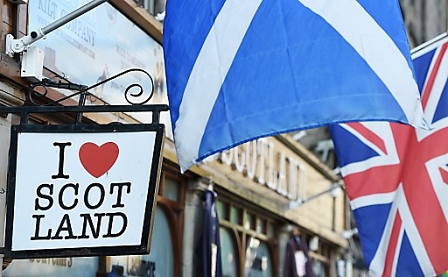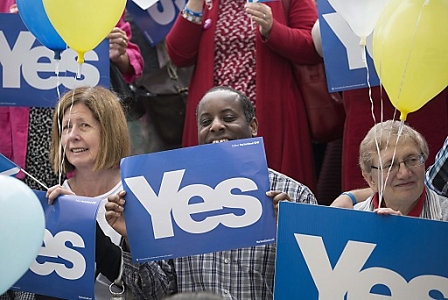Erstellt am: 12. 9. 2014 - 19:25 Uhr
Yes? No? #Indyref
As the Scots count down the days and hours until the referendum on independence on 18th September, the tension has been mounting. The opinion polls have been coming thick and fast, last weekend the “Yes” votes edged ahead for the first time and the notion of Scotland breaking away from the UK became a real possibility.
Leaders of the main British political parties dropped everything in London and headed north, in what many saw as a panic-driven attempt to bolster the “Better Together” campaign (so named, presumably, in an attempt lend a “NO” message a more positive vibe). Alex Salmond, the leader of the Scottish National Party and First Minister in the Scottish government, accused the UK party leaders of engaging in a “last-gasp” effort to try to save their own jobs.

EPA/Andy Rain
Political Engagement
While party leaders and officials jump at every opportunity to verbally bounce off their opponents in order to score political points, the people of Scotland are taking the question of their future very seriously. Voter turnout for the referendum is going to be high: 97% of the adult population have registered to vote and the electoral commission is expecting a turnout of around 80%. There has been public engagement in the debate on a scale political leaders elsewhere can only dream of.
As the British Prime Minister David Cameron has pointed out, casting a vote in this referendum is not the same as casting a vote in a general election: the outcome of a general election lasts a few years and then the voters get to do it all again and can change their mind if they wish. The independence referendum is a once-and-for-all decision. Cameron made the point as an argument against independence, but perhaps many on the “Yes” side would see it as bolstering their own position.

EPA/Stringer
The SNP says independence is the only way Scotland can become the country it wants to be. Scotland already has a parliament of its own and is in control of policy making on things like health, education, the environment, but as Ian Swanson, political editor of the Edinburgh Evening News points out “it isn’t responsible for foreign affairs or defence or, crucially, the economy and welfare.” These issues are matters for the British government in London, which is a Conservative-led government.
The important point here is that on more than one occasion the majority of people in Scotland have not voted for the Conservatives, and ended up governed by them anyway. That’s a peculiarity of the British electoral system, and a major driver of yearnings for independence.
Promises, promises...
The campaigners on both sides have presented all sorts of competing arguments and predictions about the future. When it comes to the economy, both sides have published competing reports: The UK Treasury has said every person in Scotland would be £1,400 better off each year by staying in the Union while the Scottish Government has said an independent Scotland would enjoy economic growth and make each person £1,000 wealthier after 15 years. Whether or not and independent Scotland would be able to share the pound in a currency union is another major question mark, as well as the future wealth from North Sea oil and gas, membership of the European Union and many more issues.

Joanna Bostock
This referendum is not about cultural identity. There are people who regard themselves as passionately Scottish and who believe the better future for Scotland is one in which the country remains in the United Kingdom. Alex Salmond has said people who regard themselves as British can still be in favour of independence. And it’s important to note that not just Scots, but all British citizens who are resident in Scotland are eligible to vote, as well as citizens from European Union member states and Commonwealth countries who are resident in Scotland. It’s a question of whether one believes Scotland would be better off remaining in the UK or going it alone, and that is to a large extent a question of which politicians one trusts, and whether one sees independence as a too big a risk, or a great opportunity.
Scotland Decides
A Reality Check special on Saturday, 13th September at 12 noon.


